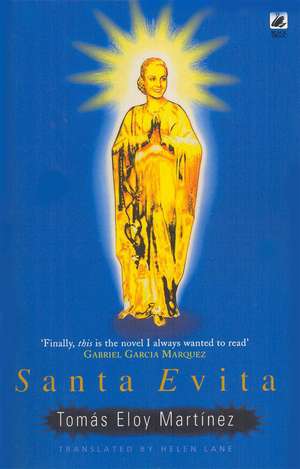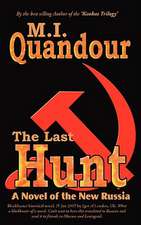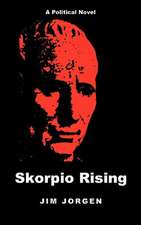Santa Evita
Autor Tomas Eloy Martinezen Limba Engleză Paperback – 31 aug 2012
| Toate formatele și edițiile | Preț | Express |
|---|---|---|
| Paperback (2) | 107.04 lei 3-5 săpt. | +11.94 lei 4-10 zile |
| Transworld Publishers Ltd – 31 aug 2012 | 107.04 lei 3-5 săpt. | +11.94 lei 4-10 zile |
| VINTAGE BOOKS – 30 iun 1997 | 113.78 lei 3-5 săpt. |
Preț: 107.04 lei
Nou
Puncte Express: 161
Preț estimativ în valută:
20.48€ • 21.39$ • 16.91£
20.48€ • 21.39$ • 16.91£
Carte disponibilă
Livrare economică 25 martie-08 aprilie
Livrare express 08-14 martie pentru 21.93 lei
Preluare comenzi: 021 569.72.76
Specificații
ISBN-13: 9780552778961
ISBN-10: 0552778966
Pagini: 416
Dimensiuni: 130 x 194 x 50 mm
Greutate: 0.29 kg
Editura: Transworld Publishers Ltd
ISBN-10: 0552778966
Pagini: 416
Dimensiuni: 130 x 194 x 50 mm
Greutate: 0.29 kg
Editura: Transworld Publishers Ltd
Notă biografică
Tomas Eloy Martinez
Extras
On coming out of a faint that lasted more than three days, Evita was certain at last that she was going to die. The terrible pains in her abdomen had gone away, and her body was clean again, alone with itself, in a bliss without time or place. Only the idea of death still hurt her. The worst part about death was not that it occurred. The worst part about death was the whiteness, the emptiness, the loneliness of the other side: one's body racing off like a galloping steed.
Although the doctors kept telling her that her anemia was in remission and that in a month or less she would regain her health, she barely had the strength left to open her eyes. She was unable to get out of bed no matter how intently she focused her energies on her elbows and heels, and even the slight effort of turning over on one side or the other to relieve the pain left her breathless.
She did not seem to be the same person who had arrived in Buenos Aires in 1935 without a penny to her name, and who acted in hopeless theaters where her pay was a cup of coffee with milk. She was nothing or less than nothing then: a sparrow at an outdoor laundry sink, a caramel bitten into, so skinny it was pitiful. She began to make herself look pretty with passion, memory, and death. She wove herself a chrysalis of beauty, little by little hatching a queen, who would have ever thought it?
...Nobody realized her illness not only made her thinner but also made her more hunched up. Since they let her wear her husband's pajamas till the end, Evita drifted about more and more aimlessly inside that vast expanse of cloth. "Don't you think I look like a Jibaro, a pygmy?" she said to the ministers standing around her bed. They answered her with adulation: "Don't say that senora. If you're a pygmy, what can we be: lice, microbes?" And they changed the subject. The nurses, however, turned her reality upside down: "See how well you've eaten today?" they kept saying as they took away the dishes she hadn't touched. "You look plumper, senora." They fooled her like a child, and the rage burning inside her, with no way out, was what made her gasp for breath: more than her illness, than her decline, than the senseless terror of waking up dead and not knowing what to do."
From the Hardcover edition.
Although the doctors kept telling her that her anemia was in remission and that in a month or less she would regain her health, she barely had the strength left to open her eyes. She was unable to get out of bed no matter how intently she focused her energies on her elbows and heels, and even the slight effort of turning over on one side or the other to relieve the pain left her breathless.
She did not seem to be the same person who had arrived in Buenos Aires in 1935 without a penny to her name, and who acted in hopeless theaters where her pay was a cup of coffee with milk. She was nothing or less than nothing then: a sparrow at an outdoor laundry sink, a caramel bitten into, so skinny it was pitiful. She began to make herself look pretty with passion, memory, and death. She wove herself a chrysalis of beauty, little by little hatching a queen, who would have ever thought it?
...Nobody realized her illness not only made her thinner but also made her more hunched up. Since they let her wear her husband's pajamas till the end, Evita drifted about more and more aimlessly inside that vast expanse of cloth. "Don't you think I look like a Jibaro, a pygmy?" she said to the ministers standing around her bed. They answered her with adulation: "Don't say that senora. If you're a pygmy, what can we be: lice, microbes?" And they changed the subject. The nurses, however, turned her reality upside down: "See how well you've eaten today?" they kept saying as they took away the dishes she hadn't touched. "You look plumper, senora." They fooled her like a child, and the rage burning inside her, with no way out, was what made her gasp for breath: more than her illness, than her decline, than the senseless terror of waking up dead and not knowing what to do."
From the Hardcover edition.
Descriere
Descriere de la o altă ediție sau format:
Nothing could be stranger than the true story of Eva Peron, who began her career as a B-movie actress, won the love of a dictator and the adoration of a nation, and, in death, achieved virtual sainthood status. Out of these facts, Eloy Martinez has crafted a work of fiction that is at once tragic, savagely funny, perversely erotic, and intellectually provocative.
Nothing could be stranger than the true story of Eva Peron, who began her career as a B-movie actress, won the love of a dictator and the adoration of a nation, and, in death, achieved virtual sainthood status. Out of these facts, Eloy Martinez has crafted a work of fiction that is at once tragic, savagely funny, perversely erotic, and intellectually provocative.




















